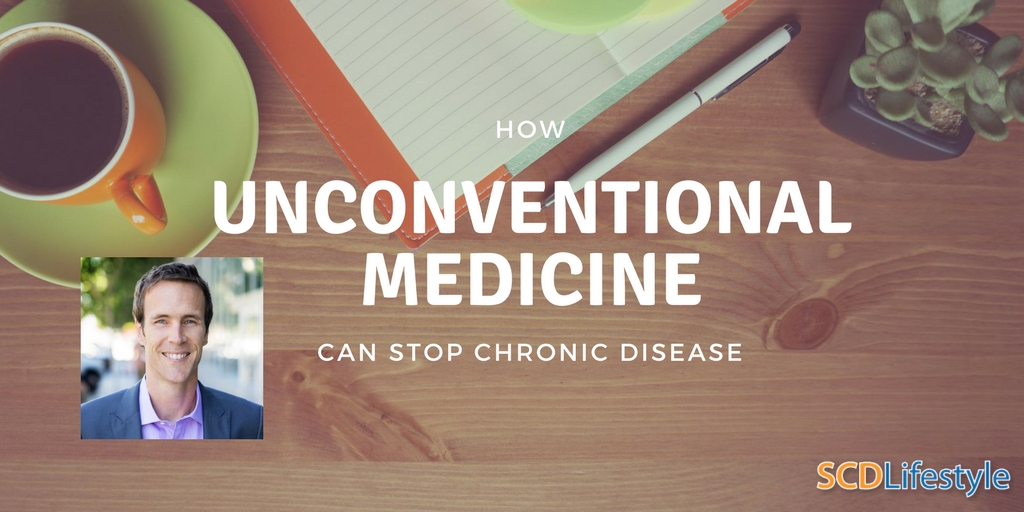What Is Functional Medicine?

10 years ago, when Steve and I were starting on our health journey, we were really fortunate to meet a guy who was on the same journey as us, but a little farther down the path – Chris Kresser.
Over the past decade we’ve had the honor of working with Chris and watching as his passion for health has blossomed into a thriving practice that is helping people around the world get healthy and live happy.
Chris has a special talent for breaking down the difficult-to-understand – from the concept of functional medicine to complex chemical processes in the body – into layman’s terms. And even more importantly into actionable steps you can take right now to feel better.
In honor of his brand new book being released today – Unconventional Medicine: Join the Revolution to Reinvent Healthcare, Reverse Chronic Disease, and Create a Practice You Love, we’re sharing a special guest post from Chris himself.
In this post, Chris shares exactly what functional medicine is and how you can use it to get healthy.
[Enter Chris]
The State Of Conventional Medicine
Imagine a patient, Yolanda, who is struggling with digestive complaints such as diarrhea, abdominal pain, gas, and bloating. She visits her primary care physician, who diagnoses her with irritable bowel syndrome (IBS). Yolanda receives several medications for her condition: loperamide to stop the diarrhea; dicyclomine for the gas, bloating, and pain; and paroxetine (an antidepressant), which her doctor said can help to manage the symptoms of IBS.
Relieved to have a diagnosis and a plan of action, Yolanda heads home and searches for “IBS” on Google. She learns that IBS is not so much a diagnosis as it is a description of symptoms. Still, she’s glad to at least have some things that she can try to get relief, so she begins taking the medications her doctor prescribed.
The loperamide does stop the diarrhea, but now she has the opposite problem: constipation. She also develops dry mouth and dizziness, which Google tells her are common side effects of this medication. The dicyclomine does seem to help with the gas, bloating, and pain, but it gives her a headache. Yolanda wasn’t able to take paroxetine for long enough to determine whether it would help because she developed severe anxiety and sleep difficulties during the first week of taking it.
At this point, Yolanda feels frustrated because, although two of the drugs helped with her original symptoms, they caused side effects that are as bad (or worse, in the case of the antidepressant).
She returns to her doctor, who tells her that they can try a few other medications, including a different antidepressant, to see if they get a better result.
Intuitively, this doesn’t make sense to Yolanda. She doesn’t want to be stuck taking several medications for the rest of her life. But when she asks her doctor what is causing the IBS, and whether there’s anything else that can be done, her doctor shrugs and says that IBS isn’t well understood, and the best they can do is try to manage the symptoms.
A Different Approach: Functional Medicine
Yolanda decided that she’d do some of her own research on alternative treatment options. In that process, she came across Functional Medicine, an approach based on addressing the underlying cause of disease rather than just suppressing symptoms. That immediately made sense to Yolanda, so she scheduled an appointment with a local Functional Medicine doctor, whom we’ll call Dr. Liu.
Even before she set foot in Dr. Liu’s office, Yolanda could tell it would be a different experience. Dr. Liu asked Yolanda to fill out several forms with detailed questions about her health history, diet, lifestyle, exercise routine, exposure to toxins, relationships, stress levels, and even early childhood experiences.
Dr. Liu also gave Yolanda stool, breath, and urine test kits that she could do at home, as well as a requisition for blood work to take to a local draw station.
Yolanda’s first appointment with Dr. Liu lasted for well over an hour. After reviewing her intake paperwork and doing a physical exam, Dr. Liu explained that Yolanda had several underlying issues that were causing the symptoms of IBS. These included SIBO, or small intestinal bacterial overgrowth, which involves inappropriate growth of bacteria in the small intestine; a disrupted gut microbiome; a parasite infection; and gluten intolerance.
At first Yolanda was skeptical. If all of these things could cause IBS, why hadn’t her primary care physician tested for any of them?
Dr. Liu explained that there are many peer-reviewed studies linking SIBO, parasites, a disrupted gut microbiome, and gluten intolerance to IBS, but that most primary care physicians are not aware of these connections.
Conventional medicine is primarily set up to manage disease with drugs, not prevent or reverse it by addressing the underlying causes.
Dr. Liu prescribed a botanical protocol to treat the SIBO and parasites and probiotics and prebiotics to restore a healthy gut microbiome. She also instructed Yolanda to eat a gluten-free, whole-foods diet low in a specific type of carbohydrate called FODMAPs that are poorly absorbed by people with SIBO and IBS.
Yolanda was excited at the end of her visit with Dr. Liu, but also overwhelmed. So much of what Dr. Liu recommended was completely new to her. Fortunately, Dr. Liu had both a nurse practitioner and a health coach on staff to help patients like Yolanda implement their new diet, treatment protocol, and other changes. Yolanda scheduled an appointment with the health coach to get started, as well as a check-up with the nurse practitioner for a month into the protocol in case Yolanda had any questions or concerns.
At the check-up, Yolanda told Dr. Liu’s nurse practitioner that she could hardly believe how much better she was feeling. In just four weeks, her diarrhea had stopped entirely, and her gas and bloating were significantly better. The pain she used to feel after every meal was also much reduced. And she was only halfway through the protocol!
Yes, the diet changes had been hard initially, but the health coach provided the support Yolanda needed to make it happen, including recipes, meal plans, ideas for snacks, and tips for shopping and eating out.
The best part was that Yolanda now felt that she was in charge of her own health; with the guidance of Dr. Liu and her staff, she was learning how to eat and what behavior and lifestyle changes to make in order to heal her gut and restore her health.
She felt so grateful that she had trusted her intuition and sought a different solution than the one her primary care physician had proposed: a lifetime of medication that not only didn’t address the causes of her symptoms, but also caused side effects that were as bad or worse.
The Doctor As A “Health Detective”
Yolanda’s story is not unusual; it’s the norm. The average appointment with a primary care doctor lasts between 10 and 12 minutes. In 10 minutes, there simply isn’t time to thoroughly investigate all the possible causes of a patient’s chronic illness. Instead, doctors consider the symptoms and prescribe the drugs, and that’s the treatment.
If that doesn’t solve the problem, the patient usually gets referred to a specialist, who examines one area of the body in isolation. If the chronic issue persists, the patient is sent to another specialist, who examines another area of the body, and then another specialist, ad nauseum.
Unfortunately, it’s rare for those specialists to communicate with one another; our current medical system isn’t set up to accommodate that kind of collaboration. Primary care doctors are supposed to unify the various discoveries, but their overwhelming caseloads often make it impossible.
What would it be like instead if doctors were empowered to approach illness like a detective approaches a case? After considering the patient’s host of symptoms, this doctor asks, “What might be causing those symptoms? Let’s do some thorough testing to determine what some of the causes might be. Once we identify those causes, we’ll start removing them and see if you still have those problems. We won’t rule out using drugs if necessary, but we’re going to focus our energy on identifying the root causes of your symptoms and addressing them all.”
This Is How Functional Medicine Operates
There are millions of patients just like Yolanda in the US. One in two Americans now has a chronic disease, and one in four are suffering from multiple chronic conditions. Conventional medicine, with its emphasis on using drugs to suppress symptoms, has failed to address this modern epidemic—and the results are catastrophic. Chronic disease is destroying our quality of life, shortening our lifespan, bankrupting our country, and threatening the health of our future generations.
We desperately need a new approach to healthcare, one that prevents and reverses disease by addressing its root causes, rather than just managing disease after it occurs. Functional Medicine is that new approach, and its popularity is growing. Last year the prestigious Cleveland Clinic launched a Center for Functional Medicine, which now has a waitlist of 2,600 patients from nine different countries.
Functional Medicine offers new hope to patients who are suffering with chronic health problems, and new tools for the doctors and other healthcare professionals who treat them.
[Enter Jordan]
Chris has been one of the most important and influential voices in my own healing journey – I hope this article was as impactful for you as it was for me.
Want more powerful information like this? Make sure you grab a copy of Chris’ BRAND NEW book – out today! It’s called Unconventional Medicine: Join the Revolution to Reinvent Healthcare, Reverse Chronic Disease, and Create a Practice You Love.
– Jordan
Did You Like this Article?
Subscribe to our newsletter to receive email notifications, some ways to find relief, and next steps.
